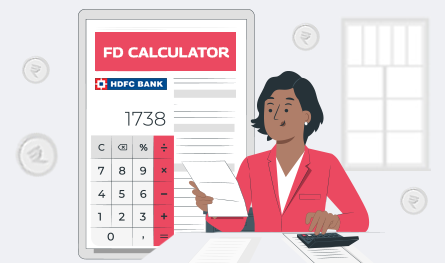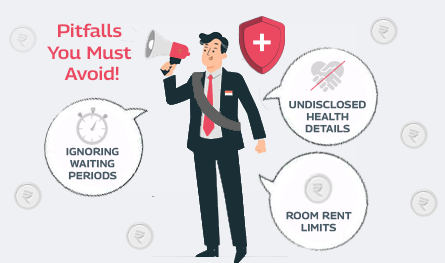Related Articles
 Jan 08, 2025
Jan 08, 2025
Is Varicose Vein surgery covered under the health insurance policy in India
 Health Insurance
Health Insurance

Some aspects of health insurance remain unclear to insurance consumers. People frequently enquire about the requirements of co-payment as a key insurance element. To answer the question, co-payment is not mandatory in all health insurance plans. However, in some types of plans, or for people with higher risks, especially senior citizens, co-payment is essential for the policy to be issued.

This explanation about co-payment works better when we analyse this article that discusses co-pay and voluntary deductions. The discussion will focus on co-payment insurance definitions alongside policy co-payment methods and explore the need for payments in health insurance policies.
The insurance requirement of co-payment ensures that you pay a specific fixed percentage of your health insurance claim amount and the associated hospital costs. As part of using health insurance benefits, you must pay this additional cost, sometimes referred to as a co-payment.
Suppose an insurance coverage plan with a 10% co-payment obligation would require you to pay a specified portion while the insurance provider shoulders the remaining bill. So, even if your total hospital bill is only Rs. 1,00,000 for a total of Rs 5 lakh policy, you would have to pay Rs. 10,000 while the insurer would pay the remaining amount of Rs 90,000.
The insurance industry primarily implements this clause to stop improper service usage. People who need to pay part of the insurance cost usually double-check their minor claim requests before submitting them.
Here, we will clarify whether health insurance plans require mandatory co-payments as a basic requirement. The short answer is no. Not every health insurance policy requires a co-payment. Health insurance products are available without requiring a co-payment. The insurance company usually gives customers better rates if they agree to pay a specified percentage of claims.
Choosing a co-payment as an option allows you to receive reduced premium costs. It really comes down to your personal choice and how much risk you’re willing to share.
Let’s break it down further. The following list details both advantages and disadvantages of the co-payment feature in your healthcare coverage.
But, it does have its downsides:
Your decision to have a co-payment depends on your own living situation and how willing you are to help pay for healthcare costs.
Under voluntary deductions, you agree to pay part of your medical expenses during hospitalisation in exchange for reduced premium costs. The terms of these deductions mirror co-payment procedures because insurers do not use them for every customer.
Health insurers require decision-makers to maintain equilibrium with their choices. A co-payment clause acceptance can lead to reduced premiums as well as reduced cases of non-essential claims. Coping with higher medical costs becomes necessary for you during times of needing medical assistance under such health insurance policies. You should evaluate these points while making your choice:
The essential step to take is a thorough examination of your daily life, together with health requirements and monetary situation.

Paybima Team
Paybima is an Indian insurance aggregator on a mission to make insurance simple for people. Paybima is the Digital arm of the already established and trusted Mahindra Insurance Brokers Ltd., a reputed name in the insurance broking industry with 21 years of experience. Paybima promises you the easy-to-access online platform to buy insurance policies, and also extend their unrelented assistance with all your policy related queries and services.

.jpg)
Having a bike is not just about convenience, it’s a huge responsibility. Financial protection of your two-wheeler is important and the best way to ensure that is to have a bike insurance policy that will protect you in case of an accident, theft or a natural calamity. There are so many options when it comes to policies, making it difficult to know what’s best. This guide makes it easier to choose the best bike insurance policy that is suitable for you.

.jpg)
Sometimes, we do not pay as much time and heed to car insurance policies as we do for life insurance plans. While this is quite natural, you must know that such a mistake can lead to heavy financial losses.
Even though people are now changing and more and more individuals have begun opting for car insurance, most people from the upper and lower-middle-class sections in India are not aware of why their insurance premiums vary so much.
Knowing about such variations and the factors that cause such variations won’t just educate you about premiums. It will also help you address higher premiums and tackle them effectively.


Fixed Deposits (FDs) are one of the safest ways to grow your savings. HDFC Bank offers attractive FD interest rates, allowing you to earn guaranteed returns on your investment. But before you invest, it's important to know how much interest you will earn and what your final maturity amount will be.


Health insurance plans are purchased with the hope of medical protection in times of need. However, sometimes it ends up being a source of surprise and disappointment. This mostly happens when people rush to buy health insurance plans, often overlooking essential aspects. Ignoring waiting period clauses, misunderstanding exclusions, and being unaware of sub-limits can lead to unwanted problems in the future.

.png)
In case of a medical emergency, cashless hospitalization is the best option to avail for anyone. This is only possible if your insurer has a tie-up with some hospitals that are covered under its network and where you can seek treatment without spending a penny. Here we share the list of network hospitals empaneled with Aditya Birla Health Insurance.
